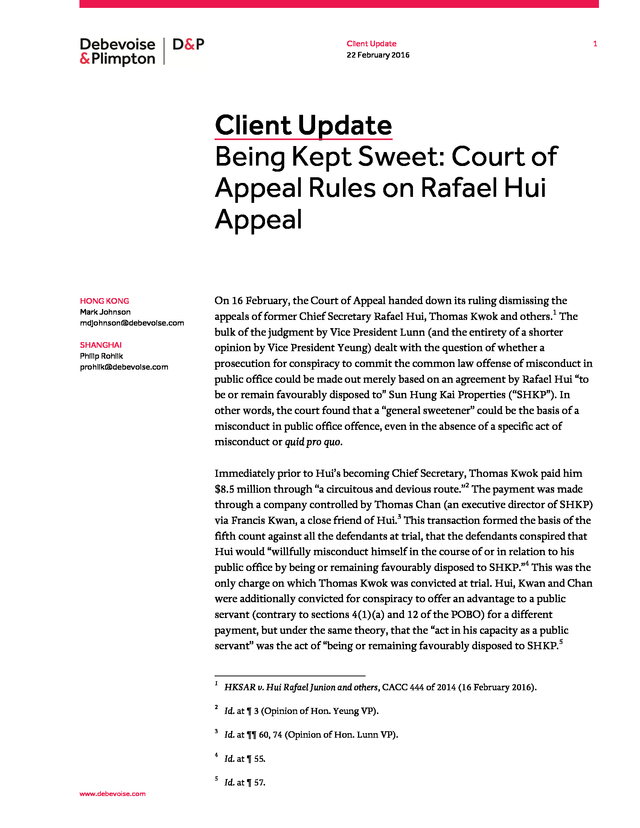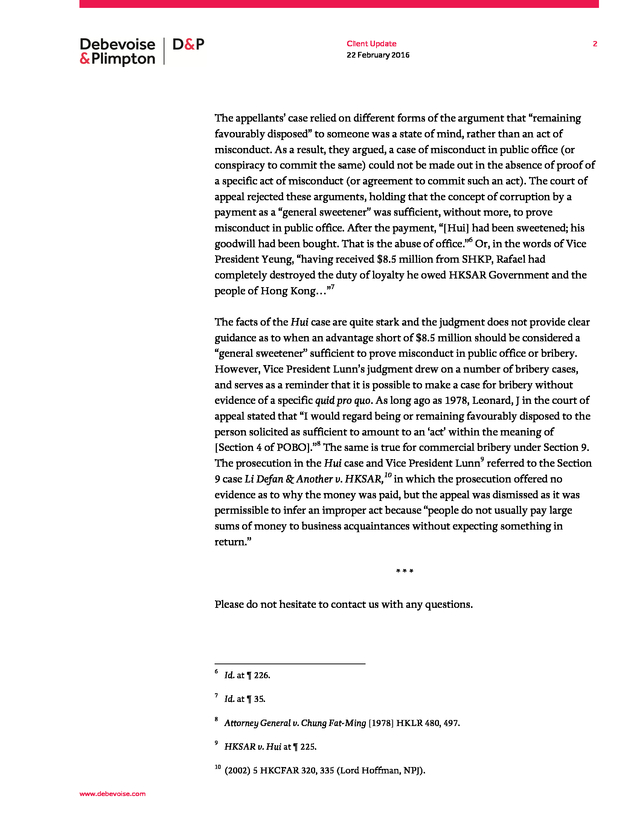Being Kept Sweet: Court of Appeal Rules on Rafael Hui Appeal - February 22, 2016
Debevoise & Plimpton
Description
Client Update
22 February 2016
1
Client Update
Being Kept Sweet: Court of
Appeal Rules on Rafael Hui
Appeal
HONG KONG
Mark Johnson
mdjohnson@debevoise.com
SHANGHAI
Philip Rohlik
prohlik@debevoise.com
On 16 February, the Court of Appeal handed down its ruling dismissing the
appeals of former Chief Secretary Rafael Hui, Thomas Kwok and others.1 The
bulk of the judgment by Vice President Lunn (and the entirety of a shorter
opinion by Vice President Yeung) dealt with the question of whether a
prosecution for conspiracy to commit the common law offense of misconduct in
public office could be made out merely based on an agreement by Rafael Hui “to
be or remain favourably disposed to” Sun Hung Kai Properties (“SHKP”). In
other words, the court found that a “general sweetener” could be the basis of a
misconduct in public office offence, even in the absence of a specific act of
misconduct or quid pro quo.
Immediately prior to Hui’s becoming Chief Secretary, Thomas Kwok paid him
$8.5 million through “a circuitous and devious route.”2 The payment was made
through a company controlled by Thomas Chan (an executive director of SHKP)
via Francis Kwan, a close friend of Hui.3 This transaction formed the basis of the
fifth count against all the defendants at trial, that the defendants conspired that
Hui would “willfully misconduct himself in the course of or in relation to his
public office by being or remaining favourably disposed to SHKP.”4 This was the
only charge on which Thomas Kwok was convicted at trial. Hui, Kwan and Chan
were additionally convicted for conspiracy to offer an advantage to a public
servant (contrary to sections 4(1)(a) and 12 of the POBO) for a different
payment, but under the same theory, that the “act in his capacity as a public
servant” was the act of “being or remaining favourably disposed to SHKP.5
1
2
Id. at ¶ 3 (Opinion of Hon.
Yeung VP). 3 Id. at ¶¶ 60, 74 (Opinion of Hon. Lunn VP). 4 Id.
at ¶ 55. 5 www.debevoise.com HKSAR v. Hui Rafael Junion and others, CACC 444 of 2014 (16 February 2016). Id. at ¶ 57. .
Client Update 22 February 2016 2 The appellants’ case relied on different forms of the argument that “remaining favourably disposed” to someone was a state of mind, rather than an act of misconduct. As a result, they argued, a case of misconduct in public office (or conspiracy to commit the same) could not be made out in the absence of proof of a specific act of misconduct (or agreement to commit such an act). The court of appeal rejected these arguments, holding that the concept of corruption by a payment as a “general sweetener” was sufficient, without more, to prove misconduct in public office. After the payment, “[Hui] had been sweetened; his goodwill had been bought.
That is the abuse of office.”6 Or, in the words of Vice President Yeung, “having received $8.5 million from SHKP, Rafael had completely destroyed the duty of loyalty he owed HKSAR Government and the people of Hong Kong…”7 The facts of the Hui case are quite stark and the judgment does not provide clear guidance as to when an advantage short of $8.5 million should be considered a “general sweetener” sufficient to prove misconduct in public office or bribery. However, Vice President Lunn’s judgment drew on a number of bribery cases, and serves as a reminder that it is possible to make a case for bribery without evidence of a specific quid pro quo. As long ago as 1978, Leonard, J in the court of appeal stated that “I would regard being or remaining favourably disposed to the person solicited as sufficient to amount to an ‘act’ within the meaning of [Section 4 of POBO].”8 The same is true for commercial bribery under Section 9. The prosecution in the Hui case and Vice President Lunn9 referred to the Section 9 case Li Defan & Another v. HKSAR,10 in which the prosecution offered no evidence as to why the money was paid, but the appeal was dismissed as it was permissible to infer an improper act because “people do not usually pay large sums of money to business acquaintances without expecting something in return.” *** Please do not hesitate to contact us with any questions. 6 7 Id.
at ¶ 35. 8 Attorney General v. Chung Fat-Ming [1978] HKLR 480, 497. 9 HKSAR v. Hui at ¶ 225. 10 www.debevoise.com Id.
at ¶ 226. (2002) 5 HKCFAR 320, 335 (Lord Hoffman, NPJ). .
Yeung VP). 3 Id. at ¶¶ 60, 74 (Opinion of Hon. Lunn VP). 4 Id.
at ¶ 55. 5 www.debevoise.com HKSAR v. Hui Rafael Junion and others, CACC 444 of 2014 (16 February 2016). Id. at ¶ 57. .
Client Update 22 February 2016 2 The appellants’ case relied on different forms of the argument that “remaining favourably disposed” to someone was a state of mind, rather than an act of misconduct. As a result, they argued, a case of misconduct in public office (or conspiracy to commit the same) could not be made out in the absence of proof of a specific act of misconduct (or agreement to commit such an act). The court of appeal rejected these arguments, holding that the concept of corruption by a payment as a “general sweetener” was sufficient, without more, to prove misconduct in public office. After the payment, “[Hui] had been sweetened; his goodwill had been bought.
That is the abuse of office.”6 Or, in the words of Vice President Yeung, “having received $8.5 million from SHKP, Rafael had completely destroyed the duty of loyalty he owed HKSAR Government and the people of Hong Kong…”7 The facts of the Hui case are quite stark and the judgment does not provide clear guidance as to when an advantage short of $8.5 million should be considered a “general sweetener” sufficient to prove misconduct in public office or bribery. However, Vice President Lunn’s judgment drew on a number of bribery cases, and serves as a reminder that it is possible to make a case for bribery without evidence of a specific quid pro quo. As long ago as 1978, Leonard, J in the court of appeal stated that “I would regard being or remaining favourably disposed to the person solicited as sufficient to amount to an ‘act’ within the meaning of [Section 4 of POBO].”8 The same is true for commercial bribery under Section 9. The prosecution in the Hui case and Vice President Lunn9 referred to the Section 9 case Li Defan & Another v. HKSAR,10 in which the prosecution offered no evidence as to why the money was paid, but the appeal was dismissed as it was permissible to infer an improper act because “people do not usually pay large sums of money to business acquaintances without expecting something in return.” *** Please do not hesitate to contact us with any questions. 6 7 Id.
at ¶ 35. 8 Attorney General v. Chung Fat-Ming [1978] HKLR 480, 497. 9 HKSAR v. Hui at ¶ 225. 10 www.debevoise.com Id.
at ¶ 226. (2002) 5 HKCFAR 320, 335 (Lord Hoffman, NPJ). .













